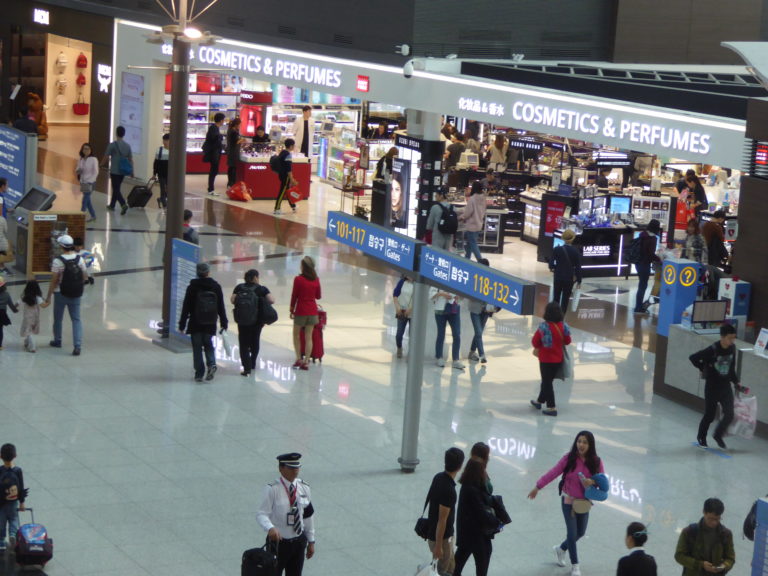
The Moodie Davitt Report is pleased to introduce a new guest column, THINK TANK, in which we invite alternative, fresh perspectives on the travel retail and aviation sectors.
After the candid, compelling and controversial column from our introductory contributor, Andrew Gardiner, Chief of Retail at Melbourne Airport, long-time airport commercial revenues executive Keith Hunter offers his own challenging take on the tender model. The former Senior Vice President of Qatar Duty Free, Hunter is Co-Founder of Hunter Palmer – Global Retail Solutions*, a consultancy that works with airlines, airports, investors, operators and hospitality companies.
[The views expressed in THINK TANK are not necessarily those of the Publisher. If you would like to contribute to this column, please contact Martin Moodie at Martin@MoodieDavittReport.com]

At the risk of sounding like I want us all to hold hands and dance around the henge [a prehistoric monument consisting of a circle of stone or wooden uprights -Ed] or join in a big group hug, airport landlords and retail tenants working more productively together can actually be to the benefit of all.
A blame-centred culture results in an impasse that inhibits the development of the model. In today’s market it is evolve or die, and we must divest ourselves of our attachments to models that might still yield profitable results, but only serve us well in the good times and don’t allow for flexibility in the bad times. Think Incheon during the THAAD crisis.
“While everyone feels they have just cause to play the injured party, the true victim is always the customer.”
In May of this year I was privileged to be part of a panel (referred to in Andrew Gardiner’s commentary) at the TFWA Asia Pacific Exhibition & Conference plenary session in Singapore. The intention of the panel was to discuss the findings and recommendations of a report produced as a result of TFWA’s collaboration with The Boston Consulting Group (BCG) to analyse the evolution of the duty free and travel retail business model.
The objective of the session was to stimulate debate amongst the panellists as well as encourage active participation from the audience, in the hope that while grievances and concerns would be aired, potential solutions could be considered. It would be fair to say that there was a packed stage, expertly handled by John Rimmer I might add, and we were all too aware that with just over an hour to wrestle with this challenging topic, it would be impossible to address it comprehensively.
As an independent consultant, it would be foolish of me to pick sides in a debate that quite clearly should see everyone taking a share of the responsibility to improve a model with flaws. There are obviously occasions when the model works: there are some airports that do not actively encourage cronyism, overbidding and/or a one-sided MAG agreement and who actively facilitate opportunities for operators to improve their business.
Equally there are retailers/operators that do not overbid and walk away from their responsibilities when times are tough, and who actually deliver on their tender promises. Sadly, however, this is not always the case.
While everyone feels they have just cause to play the injured party, the true victim is always the customer – a point raised during the plenary session!
“If you want to compete, you have to pay or someone else will.”
There is no getting around it, it looks bad for the airport when you see empty space in duty free. The customer does not know that this is the fault of a retailer withdrawing mid-contract (or sometimes before the contract has even commenced), or the fault of the airport enforcing an unsustainable rental agreement.
At different points in my career I have, like Andrew, operated both as an airport landlord and as a bidding retailer. As a landlord, my intention was always to create such an enticing business opportunity that retailers would be encouraged to bring their A-game. However, I experienced, first-hand, times when we could clearly see that a retailer had overbid and would struggle with the rental.
I chose to support them in a number of ways, including flexibility in the MAG, rather than see them fail – a result that would have been detrimental to us all and embarrassing for the airport. On the flip side, I have seen incredibly one-sided RFPs issued by certain airports, seemingly designed to scare retailers away.
Only recently I was involved in a tender, the requirements of which were so overly complicated, long-winded and unnecessary that we seriously debated if there was any point continuing. Annoyingly, more often than not, the bid reviewer will turn straight to the back page looking for the highest commercial offer, ignoring the dutifully completed list of requirements spawned by the assessment criteria.
“When it can be categorically proved that circumstances have changed since the tender was submitted, airports need to commit to helping the retailer and sharing the pain.”
Of course, any retailer who bids for space in an airport does so of their own free will. If they do not like the opportunity on offer, or they cannot adhere to the tender criteria, then they should move on.

However, it is also fair to say that many retailers are aware of the advantages of being in the right airport, and the prospect of just getting a foot in the door can be too enticing to ignore. For some, merely breaking even but achieving a valuable marketing platform makes it worthwhile. In these cases, blinded by opportunity, they will promise to pay almost anything. Airport operators know this, hence the high rent expectation. If you want to compete, you have to pay or someone else will.
However, a question should be asked: forget ‘fair’, is it business-savvy to charge a high percentage just because you can?
Rental percentages can be in excess of 40%, therefore a majority of a retailer’s profit is used to pay the rent. In some cases the profit retained is a single-digit percentage – does this really leave the retailer with enough to deliver what they promised at the time of tendering? How about achieving all the technological innovation required to attract today’s tech-savvy consumers? Is this now a possibility? Probably not.
“Equally, when times are good, and the opposite can be proved, the retailer could commit to sharing more of the spoils.”
We, as an industry, need to be honest about the challenges faced by all parties, and at least try and find a compromise in the way the concession model evolves. When it can be categorically proved that circumstances have changed since the tender was submitted, airports need to commit to helping the retailer and sharing the pain. Equally, when times are good, and the opposite can be proved, the retailer could commit to sharing more of the spoils.
Times have moved on, our customers and their habits compound that fact. In an age when retailers try to keep up by being as flexible and nimble as possible with their offer and the way it is communicated and presented, we need to strive to get a step ahead. How can this happen when the financial parameters within which retailers and airports work often remain so rigid?
To quote a previous column, ‘the model is not broken’ but, like a piano tie, it is seriously out of date!
FOOTNOTE: Wish to comment on this article? Feel free to offer your comment via the DISQUS platform below. Would you like to contribute to THINK TANK? Write to Martin Moodie at Martin@MoodieDavittReport.com
 *Hunter Palmer – Global Retail Solutions works with airlines, airports, investors, operators and hospitality companies to help develop their strategic positioning and improve business performance. The new venture is a partnership between long-time industry executives Keith Hunter and Nick Goddard-Palmer.
*Hunter Palmer – Global Retail Solutions works with airlines, airports, investors, operators and hospitality companies to help develop their strategic positioning and improve business performance. The new venture is a partnership between long-time industry executives Keith Hunter and Nick Goddard-Palmer.
Keith Hunter was formerly Senior Vice President of Qatar Duty Free for Qatar Airways. He spearheaded the Hamad International Airport retail project, designing the strategy and mix and all elements of development, through to the opening and operation of the airport in May 2014. He also served as a board member of the Middle East & Africa Duty Free Association (MEADFA) for five years.
Goddard-Palmer played a key role in the development of Hamad International Airport’s F&B programme and also served as CEO of DDFS at Indira Gandhi International airport, Delhi and as project development manager for Cyprus airports.
Contact details:
Keith Hunter:
Email: keith@hunterpalmer.net
LinkedIn: linkedin.com/in/keithhunter2016
Tel: +44 (0) 7951 799 094
Nick Goddard-Palmer:
Email: nick@hunterpalmer.net
LinkedIn: linkedin.com/in/goddardpalmer
Tel: +44 (0) 7951 799 394
Website: www.hunterpalmer.net
LinkedIn: linkedin.com/company-beta/11111778















